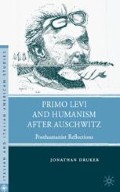Abstract
Primo Levi had a remarkable work ethic: between 1946 and 1976, when he was a full-time, industrial chemist, eventually becoming his company’s director, he also wrote five books, as well as essays, short stories, and poems. Aside from his personal need and love for work, the centrality of it in his moral universe may be attributed to several factors. He was reared and lived almost his entire life in Turin, a city with a long tradition of industry and prosperity. His family was firmly lodged in the bourgeoisie, as were the majority of the Jewish families in Turin. As an engineer, his father was a successful professional, and so were most of Levi’s male relatives. In short, he was reared in a social class which had internalized Enlightenment ideals that defined work as a positive force for re-shaping the world while solidifying one’s identity. This may explain the impetus behind some of his occasional journalism, like the essay he wrote after spending a day observing the work on a cable-laying ship in the middle of the Mediterranean Sea. In his fulsome praise of the skilled crew—he compares them to Ulysses— Levi implies that work is an appropriate subject for the highest forms of literature:
In this unusual and colossal undertaking [the sailors] have again discovered the ancient virtues of competence put to the test and of work well done. I hope that they will not be surprised nor shocked if their accounts seemed poetic to me.
Still marked so much by the concentration camps of labor and death, this post-Holocaust world deserves an entry sign. Let it read Arbeit Macht Frei. Shall those words provoke the good work that justly sets people free, or will they merely mock us all?
—Richard Rubenstein and John Roth, Approaches to Auschwitz1
Access this chapter
Tax calculation will be finalised at checkout
Purchases are for personal use only
Preview
Unable to display preview. Download preview PDF.
Notes
Richard L. Rubenstein and John K. Roth, Approaches to Auschwitz: The Holocaust and Its Legacy (Atlanta: John Knox Press, 1987), 253.
Primo Levi, “Thirty Hours on the Castoro Sei,” Other People’s Trades, trans. Raymond Rosenthal (New York: Summit Books, 1989), 203–4f.
For a general orientation on Levi and the topic of work, see Max Strata, “Primo Levi: un uomo al lavoro,” Critica letteraria 75 (1992): 369–84
and Pierpaolo Antonello, “Primo Levi and ‘Man as Maker,’ in The Cambridge Companion to Primo Levi, ed. Robert S. C. Gordon (Cambridge: Cambridge University Press, 2007), 89–104.
Primo Levi, Survival in Auschwitz: The Nazi Assault on Humanity, trans. Stuart Woolf (New York: Simon & Schuster, 1996); Primo Levi, The Reawakening, trans. Stuart Woolf, with afterword, “The Author’s Answers to His Readers’ Questions,” trans. by Ruth Feldman (New York: Macmillan, 1987);
Primo Levi, The Periodic Table, trans. Raymond Rosenthal (New York: Schocken Books, 1984);
Primo Levi, Il sistema periodico (Turin: Einaudi, 1975);
Primo Levi, The Monkey’s Wrench, trans. William Weaver (New York: Summit Books, 1986);
Primo Levi, The Drowned and the Saved, trans. Raymond Rosenthal (New York: Random House, 1989).
“I am persuaded that normal human beings are biologically built for an activity that is aimed toward a goal, and that idleness, or aimless work (like Auschwitz’s Arbeit) gives rise to suffering and to atrophy.” Philip Roth, “A Conversation with Primo Levi,” in Survival in Auschwitz: The Nazi Assault on Humanity (New York: Touchstone Books, 1986), 179.
Primo Levi, “Useless Violence,” The Drowned and the Saved, trans. Raymond Rosenthal (New York: Random House, 1989), 121.
Hannah Arendt, The Origins of Totalitarianism (New York: Harcourt, Brace & World, 1951), 456–57.
Zygmunt Bauman, Modernity and the Holocaust (Ithaca, NY: Cornell University Press, 1989), 13, 96.
Christopher R. Browning, Ordinary Men: Reserve Police Battalion 101 and the Final Solution in Poland (New York: HarperCollins, 1992);
Gitty Sereny, Albert Speer: His Battle with the Truth (New York: Alfred A. Knopf, 1995).
Max Horkheimer and Theodor W. Adorno, Dialectic of Enlightenment: Philosophical Fragments, ed. Gunzelin Schmid Noerr, trans. Edmund Jephcott (Stanford: Stanford University Press, 2002).
Hannah Arendt, Eichmann in Jerusalem: A Report on the Banality of Evil (New York: Viking, 1963), 289, 252.
For a discussion of the ramifications of the Eichmann trial in Italy at the time, see Manuela Consonni, “The Impact of the ‘Eichmann Event’ in Italy, 1961,” in After Eichmann: Collective Memory and the Holocaust since 1961, ed. David Cesarani (New York: RoutledgeCurzon, 2005), 91–99.
Primo Levi, “For Adolph Eichmann,” Collected Poems, trans. Ruth Feldman and Brian Swann (London: Faber and Faber, 1988), 24, lines 10–13.
Copyright information
© 2009 Jonathan Druker
About this chapter
Cite this chapter
Druker, J. (2009). The Work of Genocide. In: Primo Levi and Humanism after Auschwitz. Italian and Italian American Studies. Palgrave Macmillan, New York. https://doi.org/10.1057/9780230622180_8
Download citation
DOI: https://doi.org/10.1057/9780230622180_8
Publisher Name: Palgrave Macmillan, New York
Print ISBN: 978-1-349-53989-5
Online ISBN: 978-0-230-62218-0
eBook Packages: Palgrave History CollectionHistory (R0)

